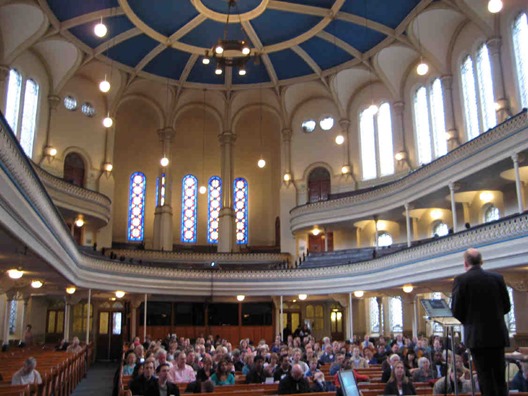Called from a most promising career in medicine, Martyn Lloyd-Jones became a preacher of great renown. For thirty years, he served as pastor of Westminster Chapel in London. Raised a Welsh “Calvinistic Methodist,” he combined the Reformers’ zeal for doctrine and the spirit of the 18th century English revivals under Wesley and Whitefield. In this passage from his book Preaching & Preachers, he speaks of the necessity of Holy Spirit power in preaching. Sermon preparation is essential, but without unction in delivery, nothing much happens.
You are in your own church preaching on a Sunday. You preach a sermon, and for some reason this sermon seems to go easily, smoothly, and with a degree of power. You are moved yourself; you have what is called ‘a good service’, and the people are as aware of this as you are. Very well; you are due to preach somewhere else, either the next Sunday or on a week-night, and you say to yourself, ‘I will preach that sermon which I preached last Sunday. We had a wonderful service with it.’ So you go into this other pulpit and you take that same text, and you start preaching. But you suddenly find that you have got virtually nothing; it all seems to collapse in your hands. What is the explanation? One explanation is this. What happened on the previous Sunday when you were preaching that sermon in your own pulpit was that the Spirit came upon you, or perhaps upon the people, (it may well have been, as I have previously explained, that it was mainly the people, and you received it from them) and your little sermon was taken up, and you were given this special unction and authority in an unusual manner, and so you had that exceptional service. But you are in different circumstances with a different congregation, and you yourself may be feeling different. So you now have to rely upon your sermon; and you suddenly find that you haven’t much of a sermon.
That helps to illustrate the difference between a sermon and the act of preaching the sermon. This is a great mystery. I hope to deal with it again. But I say this now to emphasise that the two things are different, and that true preaching means the combination of these two things. You must not rely on either the one or the other. You must not rely on your sermon only, you must not rely on the preaching act only; both are essential to true preaching.
Let me put this again in the form of a story, an anecdote. There was an old preacher whom I knew very well in Wales. He was a very able old man and a good theologian; but, I am sorry to say, he had a tendency to cynicism. But he was a very acute critic. On one occasion he was present at a synod in the final session of which two men were preaching. Both these men were professors of theology. The first man preached, and when he had finished this old preacher, this old critic turned to his neighbour and said, ‘Light without heat.’ Then the second professor preached—he was an older man and somewhat emotional. When he had finished the old cynic turned to his neighbour and said, ‘Heat without light.’ Now he was right in both cases. But the important point is that both preachers were defective. You must have light and heat, sermon plus preaching. Light without heat never affects anybody; heat without light is of no permanent value. It may have a passing temporary effect but it does not really help your people and build them up and really deal with them.
What is preaching? Logic on fire!1
![]()
![]()
Footnotes:
![]()
1 Martyn Lloyd-Jones, Preaching & Preachers (Grand Rapids: Zondervan, 1971), 96-97.





